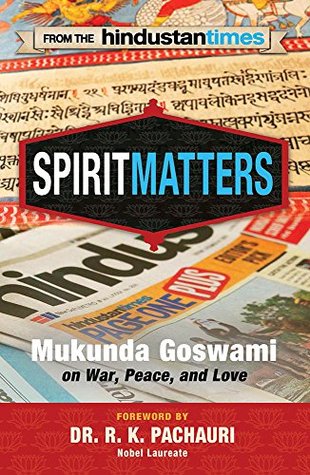Kindle Notes & Highlights
Terrorists can garner fame and recognition from their peers, but the most dangerous sorts are those who live to die heroically by killing an unsuspecting ‘enemy.’ Such persons, we learn, think that salvation means more sex, more drugs, and more fame – all in an afterworld and all for the pleasure of God.
Although God is invoked as the ultimate sanctioning agent in many conflicts, wars are fought over land, economic power, and political or tribal supremacy.
But religion – of any stripe, in any country – espouses love of God as its ultimate teaching and this is meant to transcend all confessions.
In Bhagavad-gita, God specifically advises us to develop qualities of ‘peacefulness, self-control, austerity, purity, tolerance, honesty, knowledge, and wisdom’ and that we should ‘give up all varieties of religion (sarva-dharman) and surrender unto Me.’
Desire that exceeds need easily gets out of hand and can lead to illegal actions. This is the start of criminality.
Meditation means fully focusing on our eternal nature and on the timeless Being, who is not subject to birth, death, disease, and old age – the four unavoidable problems of life.
Internal development is key to transcendental advancement.
Gandhi once said, ‘When doubts haunt me, when disappointments stare me in the face, and I see not any ray of hope on the horizon, I turn to Bhagavad-gita and find a verse to comfort me… Those who meditate on the Gita will derive fresh joy and new meaning from it every day.’
The philosophy of the Bhagavad-gita holds that we don’t actually own anything – that our nation, cars, homes, and our families ultimately belong to God. Even our own senses don’t belong to us, according to the Gita.
Without a spiritual basis to our worldview we are prone to selfishness – personal or extended – and for this reason peace is hard to find.
we argue, there’s no thrill to meditation, no zap. There’s no happiness in simply thinking about God and the spiritual world all day. Just what kind of joy is there in so-called inner happiness? Is that not the same kind of escapism that’s been embraced throughout history and that’s even been held responsible for massive violence, all in the name of God? Is that happiness?
‘Inter-denominational violence’ is generally based upon the essentially atheistic greed for more land, power, and money.
Without voluntary and loving surrender to God, we will not know peace, and the most sustainable peace prescription is God’s own pronouncement that He is the proprietor of all lands (Gita 5.29).
They seem quite different. Here’s the rub. The soul is by nature pure, blissful, unchangeable, and eternal, or so the Bhagavad-gita (2.20) would have it. So how can the pure soul be affected by impure material nature? If the soul is essentially untainted, how can worldly atmospheres recast it? As soon as a soul is ‘embodied,’ it becomes attached to its surroundings, particularly the body it inhabits. For this reason, dogs bark, cats meow, and cows moo. Human beings crave loving, eating, fighting, the arts, eating, sex, drugs, children, wealth, and intellectual prowess. But mostly, we work
...more
World peace and plans for universality ring hollow alongside exploitation and greed. Giving in a world of greed yields frustration and abuse. It makes sense to offer our time and love to God first. Then we can be sure of substantial return.
Against today’s marketeering push for instant everything from transportation to breakfast cereal, the Gita (5.24) proposes a different kind of happiness, more to do with contentedness and satisfaction, instead of the excitement generated by drugs, sex, dancing, racing, gaming, sports, and romance. All these have a beginning and an end. Transcendental happiness, subtler but deeper and permanent, doesn’t depend on external stimuli.
Those who accept that we’re imperfect beings in an imperfect world see things from a more philosophical viewpoint.
Depression is one of the symptoms of an undiagnosed spiritual sickness, to which alcohol brings instant relief.
It’s not easy to see God’s benevolent management when so many ‘innocents’ are killed each day through mindless bombings.
Love, especially between man and woman, is probably the most mysterious and misunderstood four-letter word in the world, often regarded as the ultimate emotion, whose power conquers the most adverse situation.
Transforming lust into love is a sacred responsibility for human beings.
Does pure or spiritual love include and enable human love? Can it save a shipwrecked marriage? The answer is yes. Without knowledge of transcendental love, there is no full knowledge of love.
In order for genuine affection to take place, knowledge of the lovable other is needed. An image has to become fixed in the mind – a face, a voice, a picture, a garment at the very least – some kind of reminder of the person. In other words, love requires lovable features, not lofty concepts, ethereal entities, or other vagaries devoid of attributes. This kind of ‘love’ is primitive, undeveloped, and usually self-deluding.
Unless there is substantive activity going both ways, love is merely a tired platitude without any substance – wishful thinking. In fact, love is another word for happiness and wholeness, but without features, it simply cannot exist.
In the love market, lust is trading at an all time high. The forecast on values is dire. Religion just crashed. Therapists get rich as victims of affection increase, and who wants the dry life of a sadhu?


